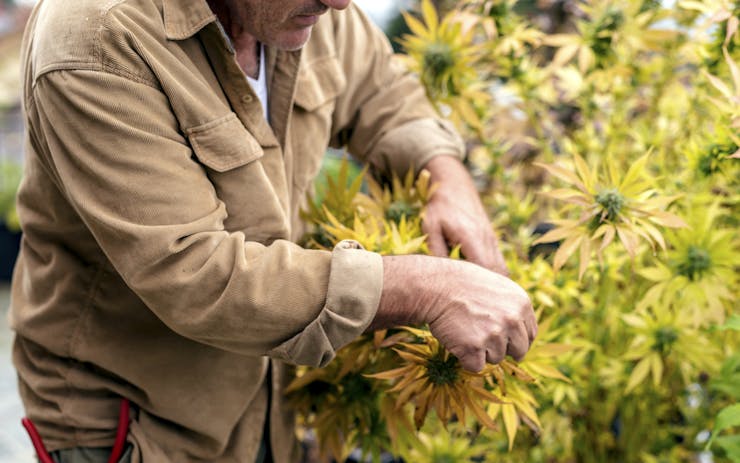Forest Gray’s resume reads like that of a man who has finally found his passion.
A biochemist whose academic studies focused on the benefits of psychoactive drugs, Gray entered the pharmaceutical world after college. A few years later he decided to abandon the sterility of the laboratory in pursuit of something even more noble: beer.
'The microbusiness model is akin to the beer microbrewery.'
He founded Speakeasy Ales & Lagers in 1997, and grew the San Francisco company to employ 50 people and produce a peak annual revenue of $10 million. Gray oversaw nearly every angle of the business, from beer recipes to logo design, packaging choices, equipment selection and quality assurance.
Then, in the months following the passage of California’s Proposition 64, Gray decided to trade in hops for cannabis.
Earlier this year he launched his new venture, Relativity Labs.
“Even though I was in beer for 20 years, it was essentially a ginormous detour,” he told Leafly.
Gray plans to translate his Speakeasy experience into building a craft marijuana brand, where he can shape the product and consumer experience, “nose to tail.” That means controlling everything from cultivation to retail. This process would typically entail multiple permits, properties and start-up costs, but under a microbusiness license proposed by the State of California, entrepreneurs like Gray would be able to submit just a single application.
“[The] microbrewery is akin really in a lot of ways to the microbusiness model,” Gray said.
A New Licensing Model
First introduced as part of Proposition 64 in relation to adult-use operations, the microbusiness license is now poised to be available to medical marijuana businesses too, courtesy of SB 94. The license would allow small businesses to act as a one-stop-shop; owners could grow cannabis on an area of less than 10,000 square feet, while also acting as distributor, non-volatile manufacturer and retailer.
This is essentially a smaller version of a typical vertical integration model, and can apply to indoor or outdoor cultivation sites, said attorney Habib Bentaleb of Harris Bricken.
Microbusiness growers don't want to compete with the Budweisers of cannabis.
“It is supposed to be a nice way for craft cannabis companies to differentiate themselves [from] what will inevitably be large-scale grow cultivations throughout the state,” said Bentaleb, who specializes in cannabis regulation and represents Gray.
Not only does this help preserve the type of small-scale or cottage operations much of the industry was built on, it streamlines and simplifies the application process, allowing entrepreneurs to apply for just one all-encompassing license. This doubles as a dramatic cost-cutting method, which offers mom-and-pop shops a slight leg up when competing against large, venture capital-fueled businesses.
Keeping With the Craft Beer Model
The microbusiness model is especially valuable for manufacturers who rely on effective branding and want to oversee the entire process leading up to sales, Bentaleb added.
People like Gray, who’ve opted to focus on production instead of cultivation, since that market is already flooded with big capital.
“To me, that’s like going against Budweiser in the beer world,” Gray said.
Will Consumption Be Allowed?
While the concept for this license is attractive and Bentaleb has seen some client interest in pursuing it, they stand to face quite a few logistical hurdles, he said. For one, there’s the issue of on-site consumption. It’s allowed under state law, and it could be huge asset to microbusinesses. But it’s also subject to the discretion of local jurisdictions, and many of their decisions have yet to be made, said Bentaleb.
The key: Patrons can consume in a microbrewery. They'll want to do the same in a cannabis microbusiness.
The idea of smoking or ingesting weed at the very spot it’s made, where customers can witness its careful production from seed to sale, could prove highly profitable.
Just look at California’s craft brewery and winery industries. In fact, it’s this format that Gray is envisioning for Relativity as he scouts possible shop locations in Sonoma County. He plans to build an artisanal cannabis operation where he produces oils and edibles to be consumed by visitors on site.
Shop highly rated dispensaries near you
Showing you dispensaries near“I’m looking forward to hosting busloads of tourists from wherever and walking them through the whole process,” Gray said. “I envision it more as an extension of the brand than as a drug store. I don’t want to run a drug store.”
Depends on Local Zoning
While the region of California that Gray is targeting is notoriously cannabis-friendly, many microbusinesses will have to grapple with individual municipalities that have their own zoning laws, which dictate where certain types of operators can set up shop.
Municipalities that permit cultivation may not allow manufacturers or dispensaries, and vice versa, Bentaleb explained. Some municipalities have already capped or outlawed dispensaries outright. This means it may be incredibly difficult for microbusiness owners to find property where they can fully exercise all portions of their permit, said Bentaleb.
“It’s almost a non-starter in most places,” he said.
Still Not an Easy Process
Even for those enterprises that do manage to find a place to legally operate and obtain a license from the Bureau of Cannabis Control, microbusiness applicants will have to meet requirements set by additional state agencies including the Department of Public Health and the State Water Resources Control Board.
“I don’t foresee it being an easy process for the unsophisticated applicant,” Bentaleb added.
Making things even more complicated is the fact that the Bureau of Cannabis Control has yet to issue the final regulations for the state, and many local jurisdictions seem to be following suit. California’s are expected to be released sometime in November, with the application process opening January 2, 2018.





